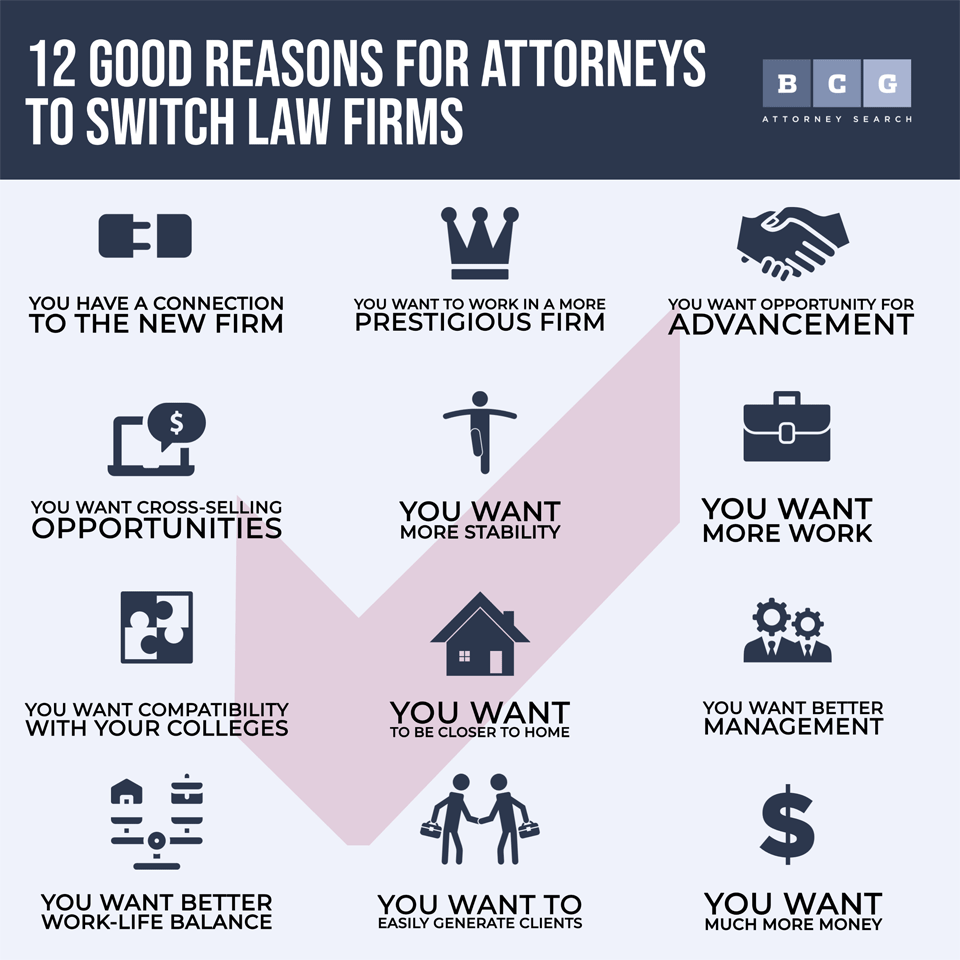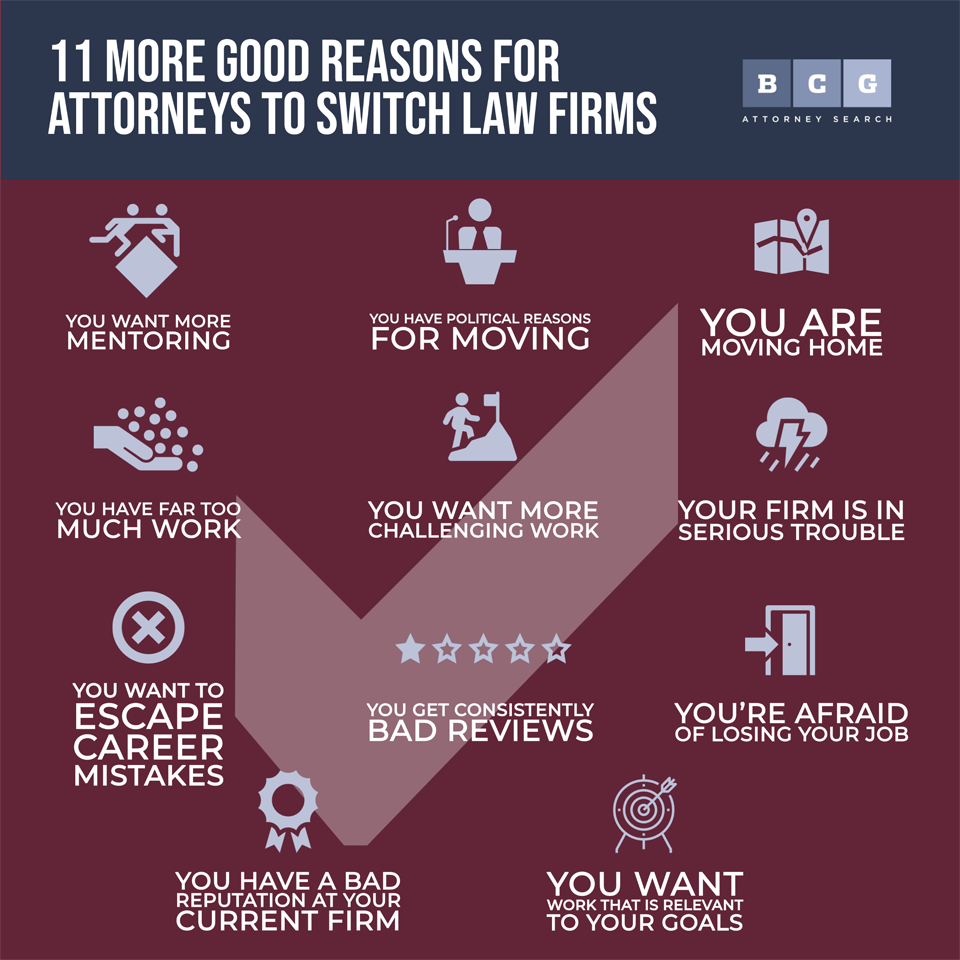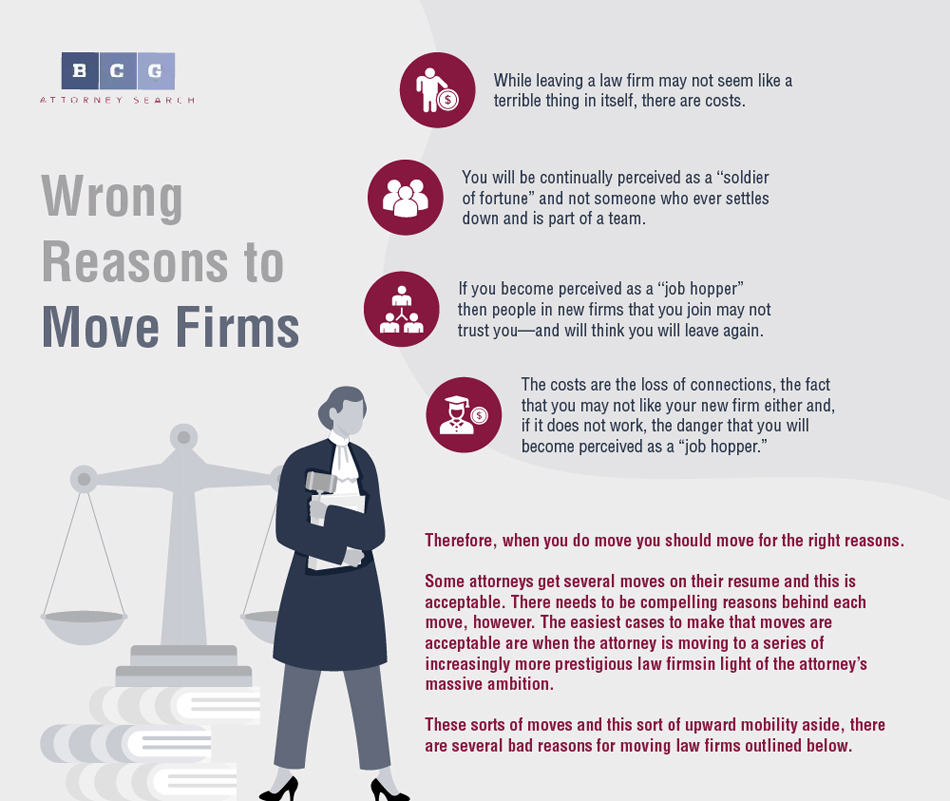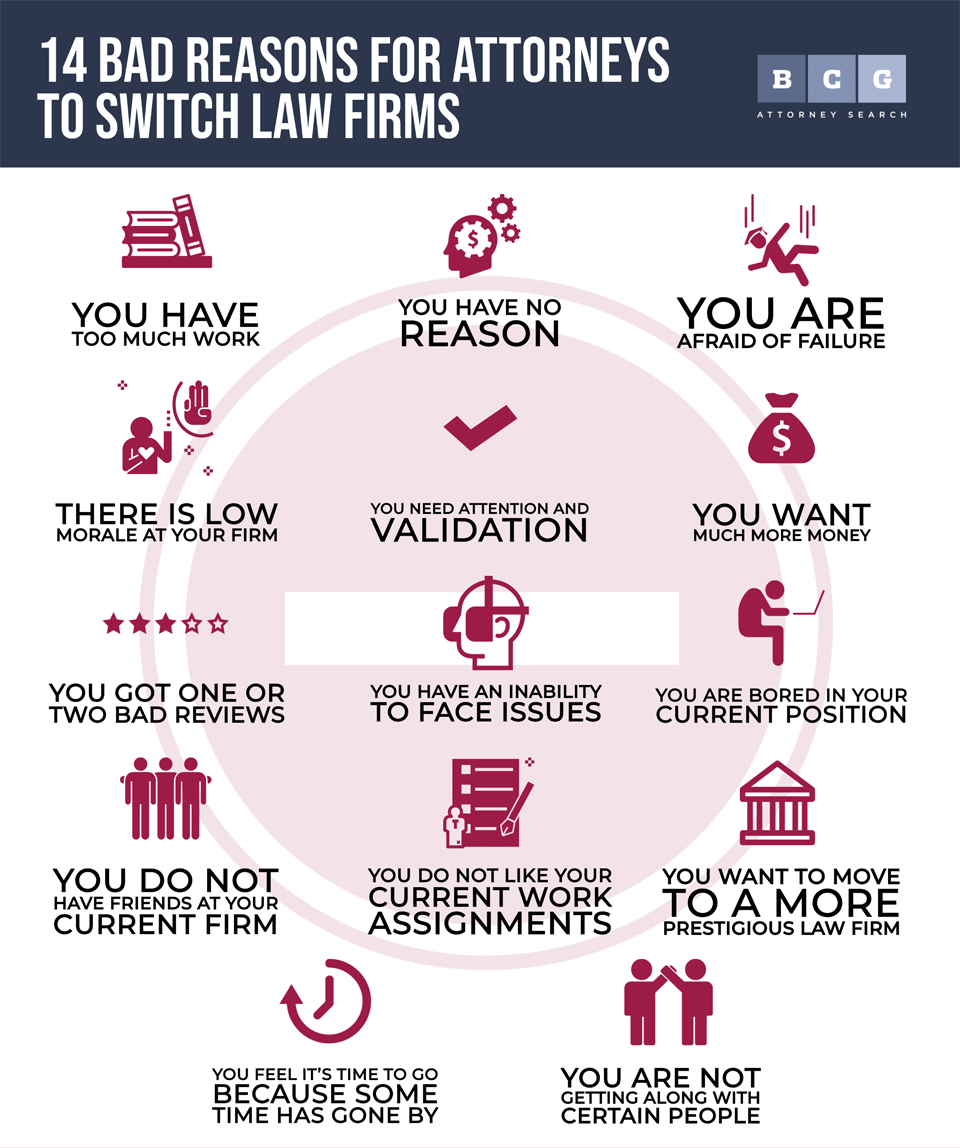- It’s not uncommon for an attorney to switch law firms.
- In fact, attorneys switch law firms for a variety of reasons.
- For whatever reason you feel you should switch, read this article first to find out if now is a good time to switch firms.
Summary: Attorneys switch law firms for a variety of reasons. Find out if it is the right time to leave your firm or whether you should stay in this article.

When I am working with any attorney, the number one thing that law firms want to know is why the attorney is looking for a new job. Firms will ask recruiters about this in every way they can in order to understand if the potential candidate is moving for the right or wrong reasons. The attorney’s education and experience are relevant to getting the law firm interested, but in order to really get the candidate through the door and hired the most important question is always going to be related to why the attorney is looking for a new job. There is no other more important question.

|
|
|
When law firms decide not to move forward with someone after an interview and give reasons such as “not enough relevant experience” and similar “generic” explanations, the real reason the law firm rejects the candidate is generally because it believes the attorney is looking for a job for the wrong reasons. If you are looking for a new position for the wrong reasons, you are not going to stay at your next job either. Law firms want people who will be stable, work hard and not create trouble. There are warning signs about future drama and trouble and law firms know the signs very well. There are right reasons and wrong reasons to look for a job and law firms are only interested in people who are looking for jobs for the right reasons.
Joining a law firm should be a decision as serious as choosing a marriage partner. Some people make decisions in a reckless manner and pay a terrible price. People marry for a variety of reasons: compatibility, money, social mobility, looks, security, sex, companionship, stability, challenge and more. Today, the majority of marriages end in divorce and an even greater number of attorneys end up moving law firms (and legal jobs) more than a few times. Because a job is such an important thing, any decision to switch firms should be made for the right reasons. Moreover, if you want to get hired at a new firm you sure as heck better know how to frame your reasons for looking for a new job appropriately.
It is very easy to make bad decisions. I was searching for a new home recently and could not believe how eager everyone was to have me make bad decisions.
- One real estate agent tried to talk me into purchasing a two-bedroom home for my entire family (I have three kids, a wife, a dog and a bird). She did this with a straight face.
- A mortgage broker tried to get me into a dangerous mortgage that was completely against my self-interest and very dangerous.
- Another real estate agent got me an offer for my home and told me it was the best offer I would ever get. Three days later I received an offer for $400,000 more.
- And do not even get me started about the homes I saw that were priced far above what they would ever sell for. Some real estate agents showed me “comps” to try and justify buying homes that were priced at twice of what they should be selling for.
When a marriage is entered into for the wrong reasons the results can be catastrophic. One or both partners will spend each day unhappy, fighting and filled with hostility. One partner may be looking for new opportunities constantly and cheating—or both may be. The people around the partners (children and friends) may be quite unhappy being around them. There will be psychological, emotional and other trauma suffered by one or both partners. There is a high potential for one or both partners to be held back because he/she/they are in a poor state and consumed with problems. There may be money problems, health problems and all sorts of other issues that go along with a bad marriage and cause suffering all around.
I have been talking to attorneys daily for most of my career about moving jobs. In some cases, the attorneys interested in moving are doing so for the right reasons. In other cases, the attorneys are doing so for the wrong reasons. Moving firms and moving jobs for the wrong reasons can have disastrous implications for an attorney’s career—just as the choice of a bad marriage partner can.
If an attorney moves for the wrong reason once, the odds are pretty good that the attorney will do it again—and law firms can see this. Just like someone who has been married four times will likely divorce again—so too will an attorney who has moved four times likely move again.
Moving for the right reasons is often the smartest thing an attorney can possibly do and moving for the wrong reasons is often the worst possible thing an attorney can do. In any event, to get a job you need to be able to give law firms the right reasons for moving.
Below I have listed what I feel are the most important reasons for moving and not moving firms. Because you rely upon your job for your livelihood and spend your days there, it is extremely important that you understand the right reasons for moving—and the wrong ones. On a daily basis I speak with people who are interested in leaving jobs for what appear to be the wrong reasons and I tell them they should not do it. I also speak with people daily who are thinking of leaving jobs for what appear to be the right reasons and I tell them they should do it.
Right Reasons to Move and When You Should Move
There are many good reasons for attorneys to move. Generally, an attorney should be moving because the attorney has ambition to make more of himself or herself, or the attorney desires to escape a bad environment (that is either self-created or exists through no fault of the attorney). Attorneys are often in positions where they simply need to leave a firm and this is acceptable. A final and important point is that law firms like to see upward mobility. While law firms never want to hear anything negative, they seem to always be impressed when attorneys are moving for reasons that involve their attempts to improve and get better—to get more work, more challenging work, work with better attorneys, work in a bigger legal market and so forth. Law firms are attracted to attorneys trying to become more; they do not like attorneys who are escaping something.

- You Have a Strong Personal Connection to the Law Firm You Are Moving To
Attorneys often get jobs in a given law firm (or interview there) because they know someone there, or have some sort of other connection there that is very strong. It could be a friend, someone they practiced with a long time ago, or some sort of other connection. Other times, the attorney may have even practiced there early in the attorney’s career. These are all good reasons to potentially join a law firm—both for the attorney wanting to join the law firm and for the attorney to give when selling himself or herself to the law firm.
Personal connections are good for a variety of reasons and the stronger the connection, the better. If there is a connection, you are more likely to be protected by the law firm during ups and downs. People want to be around and work with those they share a strong connection to. The bottom line is that when an attorney works with people the attorney knows and trusts, the attorney is much better off and set up for long-term success. Many attorneys spend their entire careers working with the same few people and survive when they otherwise might not.
On a related note, finding small connections can often get you jobs. Connections can even be trivial – and this often works. My grandfather was a college friend of Thomas Dewey, the namesake of the law firm Dewey Ballantine. I brought this up during an interview and the law firm seemed to really like it and I ended up working in the firm. Is this a connection? Hardly. Notwithstanding, it may have worked.
You can use connections to get jobs. You should be careful, however. The connection you use to get a job and your reasons for using this connection need to be strong. Please see the following article for more information on this topic:
- You Want to Work in a Much More Prestigious Law Firm
This is sometimes the right reason to move law firms and other times it is the wrong reason. Generally, but not always, a more prestigious law firm will provide more opportunities for higher level advancement for an ambitious attorney. This is not to say attorneys should move just because a law firm is more prestigious—rather, they should move if they are very ambitious and up for the challenge.
When I review attorneys’ resumes and when law firms do, we generally look favorably upon attorneys who start out at small law firms and through a series of moves land in more and more prestigious firms. These attorneys go into interviews with more prestigious law firms and get jobs because the firms know they can harness that ambition into hours, business and more. Law firms want people who have spirit and are motivated to get ahead.
If you are applying to a more prestigious law firm, the more prestigious law firm will generally offer you the opportunity to work on larger and more sophisticated clients, to attract work from more sophisticated clients and to have a better name behind you. There are still countless other factors you need to evaluate, but in general a more prestigious law firm carries more weight in the market than a less prestigious law firm. Just as someone admitted to Yale Law School would be crazy to go to a school like Vanderbilt instead, generally an attorney is better off at a more prestigious law firm if the attorney is planning on spending his or her career there—and believes that he or she is a strong enough attorney to be able to survive and prosper in a more prestigious law firm. Learn more about how you can move up to a more prestigious law firm in this article:
- You Want More Opportunity for Advancement
While moving to a prestigious law firm is often a good idea, sometimes moving to a less prestigious law firm where there are more opportunities for advancement is an excellent idea as well. There are some law firms where making partner is virtually impossible. If you are in a position where there is not opportunity for advancement at your current firm, one of the smartest things you can do is move to a smaller law firm where there are opportunities. (The largest and most prestigious law firms will, however, often delay making attorneys partner for a long, long time in order to weed out attorneys on their own—and many attorneys who go to smaller firms, in-house jobs and so forth might very well have become partners had they stayed.)
If you are ambitious and truly feel that you are being held back at your current firm, then going to a firm with more opportunity for advancement can be an excellent choice.
- You Want Better Cross-Selling Opportunities
Many attorneys (partners especially) move to firms that may offer them better cross-selling opportunities. For example, an attorney at a law firm that only does patent prosecution may move to a law firm that also does patent litigation, corporate and other types of work so that the attorney can maintain a closer relationship with his or her clients and not worry about those clients being poached by other law firms with more resources to handle their diverse legal matters. This is a legitimate reason for moving law firms.
- You Want More Stability
There are some law firms that seem to constantly be experiencing periods of turmoil due to various reasons. The law firms may be experiencing major and frequent departure of partners, losing very important clients, or other issues. If a law firm is not stable and is having consistent problems that make it an extremely difficult place to work and stay comfortably employed in, then a decision to move may be in an attorney’s best interest. An attorney needs to be in a position to put down roots and work hard with the expectation that the firm will be around in the future. If the law firm is not stable and having serious ongoing problems then there are good reasons to pick up and leave.
A lack of stability does not mean that the law firm is having temporary problems, however. Law firms go through consistent ups and downs and are always having one problem or another. If a law firm is growing quickly there will be growing pains. If the market is slow there will be layoffs. Lack of stability generally means that a law firm is coming apart at the seams or constantly seems about to go out of business. If this is the case there are generally signs and the attorney should be looking elsewhere.
- You Want More Work
Work is one of the most important things at any law firm. Attorneys need to constantly have work. If work slows down then this is not a good sign. Generally, you should always have something to do (and bill) when you go into the office and if you are constantly looking for work – or if there is no work available for an extended period of time—then this is a good reason to move. A “dry patch” of no work generally leads to layoffs when it lasts more than a month or two.
In some law firms, attorneys are “frozen out” and not given any work at all. If this is happening to you, your first order of business is to try and get work and also to start looking for a job.
If there is simply not enough work because the people you are working with/for do not have enough work, it is also generally not a good sign. There may be business problems at the law firm preventing you from getting work and threatening your livelihood. This is not a good sign and you need to be careful when this occurs. You always need to be in an environment where there is enough work to sustain you.
None of this is to say that you should leave when work slows down; however, a consistent lack of work is a bad sign because it means your job is at risk. A lack of work also means that there are going to be fewer advancement opportunities. Please see the following article about why access to work is vitally important for any attorney and his or her career:
- You Want Better Compatibility with the People You Work With
Some attorneys are simply not compatible with the people they are working with. Different people have different personalities and if an attorney does not fit in with one group of people then the attorney would be well advised to find a different group of people with whom they are more compatible. There is absolutely nothing wrong with moving jobs and switching firms if you are not compatible with a group of attorneys. Please see the following article for more information on the importance of a firm’s culture:
- You Want to Be Closer to Home
For whatever reason, many attorneys take positions that make little sense for them geographically. I’ve spoken to attorneys who drive two and half hours to work each day. I know other attorneys who need to fly home each weekend to be with their families. If an attorney is in a position where the firm they are working for is simply too far from the attorney’s home, then relocating to a location that is more convenient is a perfectly acceptable reason to move.
- You Want Better Management
Some law firms are poorly managed or going through major changes due to new management. It is very common for law firms to all of a sudden have younger managers come in and make major changes in an effort to make the firms more profitable. This happens quite frequently. When it does there are good reasons for attorneys who are not happy with the changes to move. A law firm that is better managed will create more security for its lawyers, more opportunities and other advantages. A law firm that is poorly managed can lead to a toxic culture and be driven out of business.
- You Want More Time with Family or a Better Work-Life Balance
Some law firms offer a better work-life balance than others. A law firm with more work-life balance (that holds itself out as offering this and does in fact offer it) is often a good choice for attorneys who may be unhappy at their current law firms. There is nothing wrong with an attorney wanting to break away from the rat race and join a law firm where there are increased opportunities to spend more time with family and have a better work-life balance. There are few true lifestyle firms, though, and many times an attorney will need to find a position outside of a law firm in order to escape the pressures of a law firm. Please see the following article about why there are no “lifestyle” firms:
- You Want to More Easily Generate Clients
Many law firms have billing rates that are so high the only types of clients that would conceivably be interested in paying such high rates are giant corporations. If an attorney is interested in generating work and having his or her own book of business, the attorney’s only choice is often to go to a smaller law firm with lower billing rates. Many attorneys consciously make the decision to do this each year and do not regret having done so at all. The ability to bring in clients gives them freedom to become business generators and enjoy all of the advantages this brings. Please see the following article for more information about this topic:
- You Want Much, Much More Money

Money is often a reason NOT to move firms, but it can also be a good reason to move law firms. The money differentials between what attorneys are paid at different law firms are often quite significant. While money alone is not necessarily the best reason to move firms, it is often an excellent one because an attorney may be able to make twice or three times as much money for the same amount of work. Money is a factor in many attorney moves and there is nothing wrong in wanting to get paid as much money as possible for the work you are doing.
- You Want More Mentoring
There are some law firms that provide mentoring and strong training to attorneys. While this alone is not necessarily the best reason to move, it is a factor to consider in evaluating a move. If an attorney will have a mentor at a new firm – someone inside the new firm that the attorney believes will take the attorney under his or her wing and provide support – then that is a valid reason for a move. Learn how to find a mentor in this article:
- You Have Political Reasons for Moving Firms
Some law firms develop all sorts of factions that are political in nature and may involve money, client conflicts or other issues. Regardless, a toxic law firm environment where you are on the wrong side of these political divisions can be a dangerous thing for your future. Many attorneys who are uncomfortable with these political aspects often move firms to get in more supportive environments.
- You Want More Challenging Work
Some law firms do not do the kinds of challenging work that other firms do. Larger firms may do more sophisticated work than smaller law firms, for example. Law firms respect an attorney’s desire to do work that is as challenging as possible and this is always a good reason for an attorney to give for moving.
- You Want More Focused Work or Work That Is More Relevant to Your Experience (or Goals)
It is very common for attorneys in certain firms to suddenly find themselves doing work that they are not interested in doing, or not trained to do. For example, I have seen numerous patent attorneys with biological backgrounds and training working at firms where they are given only electrical-related patents to work on. I’ve seen corporate attorneys forced to do litigation-related work when there is not corporate work available for an extended period of time.
Other attorneys may be interested in doing a certain type of work they are not getting at their current firms. A litigator may be interested in doing entertainment litigation, white collar, or intellectual property litigation, for example, and that is not available at his or her current firm. The desire to do a different type of work—if compelling—is often a very good reason for attorneys to move law firms and one that firms accept for moving.
- You Have a Bad Reputation at Your Current Firm
Many attorneys get bad reputations at their current firms for a variety of reasons. These reasons could be related to a bad mistake, something they said or did that was inappropriate, or because people simply do not like them. There are times when the mistake is so severe that the attorney cannot recover. Some examples I have seen:
- An attorney calling a reporter and talking about confidential client information that got reported in the paper.
- An attorney getting drunk at a party and grabbing the breasts of a company client.
- An attorney sleeping with a powerful partner and then stalking her.
- An attorney forgetting to attach an important document to a filing that ended up losing a case for a client.
- An attorney sleeping in and missing an important client closing.
- An attorney getting in a huge fight with a bunch of other associates and causing a scene (outside of work).
- An attorney lying to a partner about having done something that was not done.
- An attorney who talked negatively about virtually everyone in the firm behind their backs.
- An attorney getting sued for sexual harassment by his secretary.
- An attorney getting sued for malpractice for making serious errors on a case that drastically hurt the firm’s reputation in the market for some time.
- A partner impregnating an associate who proceeded to have the baby.
I give each of these examples to give you a flavor of when your reputation can be seriously damaged beyond repair. Many attorneys leave firms after this sort of thing and then (generally) give one of the other reasons in this article for leaving when they do.
- You Want to Escape Early Career Mistakes
Young attorneys are “green” and frequently make a variety of mistakes such as those above that may brand them within the firm as less than competent among some others in the firm—and superiors. These mistakes are generally not all that serious, but are such that the attorneys may feel that to make the most of their careers and be trusted with the most important work they need to move law firms. This is often a good strategy, because the attorney can go into their new firms as a super confident and competent attorney who will not make the same mistakes twice. Being viewed as a more competent attorney at a new firm can put the attorney in a more positive light.
- You Get Consistently Bad Reviews
An attorney who is getting consistently bad reviews (undeserved or not) should generally leave. A law firm that does not appreciate you and your work (assuming you have made a serious effort to improve) is generally not a place where you are likely to succeed over the long run and you should leave.
- You Have a Realistic Fear of Losing Your Current Job
If people around you are losing their jobs and because of a variety of factors (lack of work, poor reviews, no mentor, no connections to tell you where you stand) you think you are going to lose your job too, then you should look for a new home. If you think you are going to lose your job because of something you did, did not do, or said—then it is wise to look around as well. It is exceedingly difficult to find a new job if you leave your current firm without a new job lined up. Attorneys should always have a backup plan in place if they are worried about losing their job. Learn more about this topic here:
- Your Firm Is in Serious Trouble
If your firm is in trouble then it is a good idea to look around. You should not stay in a sinking ship. If your firm is in serious trouble the odds are that others will be aware of this as well and you may not even need to bring it up. It is always a good idea to look around if your firm appears to be in very serious trouble.
- You Have Far Too Much Work
There are circumstances where there is legitimately far too much work and attorneys have a near impossible time getting out of work—in the evenings and on the weekends. There are some firms where there is so much work, so consistently and so incessantly that an attorney may need to leave for the attorney’s own health and well-being. Some attorneys can handle these sorts of demands and others cannot. If an attorney does not believe that he or she can handle it then the best thing to do is to leave.
- You Are Moving Home (to Where You Are From or Were Raised)
If you are from a given area and working in another area of the country, it is always acceptable to tell firms you are interested in moving back home. Law firms respect this reason and it generally always is an acceptable reason for looking for a new job.

Wrong Reasons to Move Firms
While leaving a law firm may not seem like a terrible thing in itself, there are costs. The costs are the loss of connections, the fact that you may not like your new firm either and, if it does not work, the danger that you will become perceived as a “job hopper.” If you become perceived as a “job hopper” then people in new firms that you join may not trust you—and will think you will leave again. You will be continually perceived as a “soldier of fortune” and not someone who ever settles down and is part of a team. Moreover, the more times you leave firms for the wrong reasons the harder it will be for you to get hired again. When the right opportunity really does come along you will have a harder time being believed.
Law firms want to hire people they believe are going to be with them for the long haul. If you get a few bad moves on your resume that suggest you are anything but a team player, you are going to have a difficult time getting a new position. Therefore, when you do move you should move for the right reasons.

Some attorneys get several moves on their resume and this is acceptable. There needs to be compelling reasons behind each move, however. The easiest cases to make that moves are acceptable are when the attorney is moving to a series of increasingly more prestigious law firms in light of the attorney’s massive ambition. These sorts of moves and this sort of upward mobility aside, there are several bad reasons for moving law firms outlined below.
- You Are Bored in Your Current Position
Many attorneys move because they get bored with their law firms and the routine. This is never a valid reason for moving and not something that is a good idea at all. If you are bored in your current position you may just be bored with the practice of law itself. Some people cannot cope with the routine of going into an office each day and working with a bunch of like-minded individuals. It is perfectly acceptable if you are not interested in doing this anymore, but changing law firms is generally not going to make a difference.
Years ago a friend of mine called me and told me I should come work at his law firm because the attorneys were a bunch of high-profile entertainment attorneys doing deals. He told me they were running around in their convertibles talking on cell phones while putting together movies and it sounded quite exciting. When I got to the law firm to interview, however, what I found was the same thing there was in every other law firm: A bunch of attorneys sitting behind desks typing away. It was the exact same. I guess they were doing interesting deals, but they looked and acted like attorneys everywhere else. One of the associates I spoke with told me he had a Mazda Miata in the parking lot. Maybe he was doing movie deals while driving around in that.
- You Need Attention and Validation
Most attorneys may enjoy the process of looking for a job a bit because it is exciting and a break from the ordinary. It is exciting getting interviews, meeting new people and waiting in anticipation for another interview and an offer. The right offer can change your life. Nevertheless, there are some attorneys who are constantly looking for positions and this is not healthy. This is like the person who gets married and is constantly seeking a new companion before ever settling down. Sometimes it is best to just work on what you have got right now instead of constantly being on the lookout for something better. See the following article for more information:
- You Are Afraid of Failure
I see many attorneys move around from firm to firm because they seem afraid of failure. Some move despite the fact they have not failed but are afraid that the longer they are at the firm the more likely they will be to fail! We are getting into some deep “Freudian-like” territory here, but many attorneys are perfectionists and extremely afraid of failing. The moment they think they may fail, or it looks like they are going to fail in the future, they start looking around for something new.
If this all sounds a little far out there, it should not. Consider the fact that virtually every attorney who starts out in a large, prestigious law firm leaves before they ever have the opportunity to even be considered to make partner. Most attorneys who join large law firms do so declaring they would like to be partners. Presumably something along the way “psyches them out” and they leave because they do not want to put in the time and effort and fail. They often leave because they feel they are going to fail before they have ever put in a concerted effort.
I have learned to question and probe my candidates and get a lot of information from them when I work with them. I learn a great deal about them and what is going on and I often find that they will leave to avoid failing, or the perception of failing. Some attorneys time their job searches so they leave and give notice before reviews come when they do not think they are having a good year.
There is nothing wrong with failure if you learn from it. Some of the best experiences out there come from failure. Failure makes many people much stronger and the lessons from failure can make you come back stronger the next time. Learn more in this article:
- You Want to Move to a More Prestigious (or Hotter) Law Firm
While moving to a much more prestigious law firm may be a good reason to leave, simply moving to a more prestigious law firm is not. There will always be more prestigious law firms out there and firms that are perceived as better than where you are for one reason or another. Your job—like a marriage—is not a fickle popularity contest with a constantly moving scoreboard where you can be on the winning team at all points in time.

- You Want More Money
Money is generally not a reason to move unless there is a lot more of it. If a law firm will pay you 30%+ more this may be a reason to consider moving, but you should only consider moving for money if there are other things such as stability, connections and other positives that make your move a smart choice. In many instances, once taxes are taken into account your move is not going to leave much more money in your pocket anyway to make it that worthwhile.
One trade off that generally comes with more money is less long-term security and also the expectation that you will work harder for that money. A large paycheck may also require that you work in a large city where there are a host of other inconveniences, higher taxes and other issues that make the job less palatable. The largest law firms typically pay the highest salaries because their attorneys are in some cases making “deals with the devil” that the law firms will readily acknowledge. If you make one of these deals, in exchange for some of the best years of your life, you will be expected to work extremely hard with the prospect of not having a job at the same firm after several years. Were you to join a small law firm with less pay, at the same time you are getting pushed out of the larger law firm you might have been a partner (with clients) at the smaller firm.
It is never a good idea to move firms just for a small amount of money—and even a major amount of money requires that you look very carefully at the risk versus the reward for the greater amount of money.
- You Have an Inability to Face Issues
Some attorneys have serious issues with things like working under pressure against deadlines, not turning in assignments unless they are 100% perfect (and then not getting them in on time), making lots of typos, being careless and missing things and other issues. These sorts of issues are things that attorneys need to face and correct and many attorneys leave jobs because they cannot face their demons at their current firms. You generally want to correct this stuff where you are and do so immediately. Running from firm to firm to solve these issues never changes anything—but many attorneys do this consistently.
I knew an attorney who had serious substance abuse problems that generally ended up coming out the longer he was at a law firm. When these issues started coming out, rather than face them he would move firms before the firm could confront him. While he was able to keep up his various addictions, he was never able to face the real issues that were causing him problems and fix himself.
- You Got One or Two Bad Reviews
One or two bad reviews are generally not a reason to leave a law firm. Law firms will typically review junior associates very negatively in an effort to get them to improve and get their hours and work quality up. These reviews are often “par for the course” at many law firms. Unless the reviews are explicitly hinting you should look elsewhere, then the odds are you should take them extremely seriously, but do not need to look for a new job.
- You Have Too Much Work
Despite the fact that some firms may have too much work, in most cases there are limits to how hard a group of people will work for an extended period of time. Having work to do is generally a good thing. If there is a lot of work then the law firm is presumably healthy, doing something right and has opportunities for advancement.
It is generally not a good thing to announce to a new potential employer that you are looking for a new job because there is too much work. Law firms want to have a lot of work and they want to believe that you will work hard if you join them as well. As a general rule, if you have too much work then the smartest thing to do is to try and make things work.
Finally, attorneys should generally enjoy the work they do and it should empower them to some extent and make them feel good. If an attorney likes what he or she is doing the attorney should not mind long hours and should take some joy in the hard work. If you do not enjoy work then you should probably be doing something different.
- You Have No Reason
An attorney should always have a reason for moving—you should not move “just because.” I hear this reason for moving on an almost weekly basis and attorneys should only move if there are good reasons for moving. You need to have concrete reasons that make sense for switching jobs.
- There Is Low Morale at Your Current Firm
All law firms go through persistent periods where the morale is up and then it is down. The morale will constantly vacillate at law firms and this happens with all businesses. You should be concerned with yourself and should not get sucked up in the vacillating tides of negative opinion at work. It will do you no good whatsoever.
- You Do Not Have Enough Friends at Your Current Firm
Some attorneys switch jobs because they want to go to a firm where they feel like they may have more friends. While this seems hard to believe, this sort of thing should never factor into your decision to leave a law firm. In addition, you are at work for professional and not social reasons.
- You Do Not Like Your Current Work Assignments
Many attorneys leave jobs because they are unhappy with being staffed on certain matters. A move is permanent and something that cannot be changed. In contrast, for a career that may last 40 or more years, a group of assignments that an attorney does not enjoy is something that will go away after some time. Generally, an attorney should try and get better assignments if the attorney is unhappy with his or her current work assignments.
- You Feel It’s Time to Go Because Some Time Has Gone By
There is no invisible clock that says you need to move after a few years of experience. In fact, if you are doing well at your current firm and enjoy it then it may make more sense to stay there. Many law firms have a “hidden bias” in favor of attorneys who started off with them as summer associates, or joined them out of law school. Regardless, the longer you are with a given law firm the more “political capital” you may have and the more sense it may make to stay there.
- You Are Not Getting Along with Certain People
Many attorneys switch firms and move because they have a hard time with another attorney, or even a small group of attorneys. Unless this attorney (or small group of attorneys) controls the entire firm, this is generally not a reason to leave. You are never going to be able to get along with or please everyone no matter where you go. If you do not get along with certain people, the best thing you can do is avoid them and find other people to work with. Time generally heals issues and there will generally be issues with people in whatever law firm you end up in. If you leave a job because you cannot get along with certain people you are generally going to be moving a lot.
While there are many potential reasons for attorneys to move law firms, an attorney should never move for the wrong reasons. Attorneys make huge mistakes with their careers when they move law firms haphazardly. While there are a variety of reasons for moving firms, ultimately any reason you choose for moving firms should be taken with the same level of thought as you would leaving a marriage and joining a new one. Questions you should ask should be along the lines of:
- Is my current job intolerable?
- Will I be happier in the new position?
- Is my current job beyond repair?
- Is this just a short-term difficulty?
- Are there things about myself that will make this work better if I fix them?
- Will I have potential to be and do more in a new position?
- Do I know in my heart this will not work?
You need to remember that a decision to leave a law firm and look at something else is a serious life decision and must be undertaken with great consideration. At the very least, you should only embark on a move after you have evaluated all of the “right” and “wrong” reasons explained in this article and after you have made a meaningful, honest inquiry into the above questions.
Click here to contact Harrison
About Harrison Barnes
No legal recruiter in the United States has placed more attorneys at top law firms across every practice area than Harrison Barnes. His unmatched expertise, industry connections, and proven placement strategies have made him the most influential legal career advisor for attorneys seeking success in Big Law, elite boutiques, mid-sized firms, small firms, firms in the largest and smallest markets, and in over 350 separate practice areas.
A Reach Unlike Any Other Legal Recruiter
Most legal recruiters focus only on placing attorneys in large markets or specific practice areas, but Harrison places attorneys at all levels, in all practice areas, and in all locations-from the most prestigious firms in New York, Los Angeles, and Washington, D.C., to small and mid-sized firms in rural markets. Every week, he successfully places attorneys not only in high-demand practice areas like corporate and litigation but also in niche and less commonly recruited areas such as:
- Immigration Law
- Workers Compensation
- Insurance
- Family Law
- Trust and Estate
- Municipal law
- And many more...
This breadth of placements is unheard of in the legal recruiting industry and is a testament to his extraordinary ability to connect attorneys with the right firms, regardless of market size or practice area.
Proven Success at All Levels
With over 25 years of experience, Harrison has successfully placed attorneys at over 1,000 law firms, including:
- Top Am Law 100 firms such including Sullivan and Cromwell, and almost every AmLaw 100 and AmLaw 200 law firm.
- Elite boutique firms with specialized practices
- Mid-sized firms looking to expand their practice areas
- Growing firms in small and rural markets
He has also placed hundreds of law firm partners and has worked on firm and practice area mergers, helping law firms strategically grow their teams.
Unmatched Commitment to Attorney Success - The Story of BCG Attorney Search
Harrison Barnes is not just the most effective legal recruiter in the country, he is also the founder of BCG Attorney Search, a recruiting powerhouse that has helped thousands of attorneys transform their careers. His vision for BCG goes beyond just job placement; it is built on a mission to provide attorneys with opportunities they would never have access to otherwise. Unlike traditional recruiting firms, BCG Attorney Search operates as a career partner, not just a placement service. The firm's unparalleled resources, including a team of over 150 employees, enable it to offer customized job searches, direct outreach to firms, and market intelligence that no other legal recruiting service provides. Attorneys working with Harrison and BCG gain access to hidden opportunities, real-time insights on firm hiring trends, and guidance from a team that truly understands the legal market. You can read more about how BCG Attorney Search revolutionizes legal recruiting here: The Story of BCG Attorney Search and What We Do for You.
The Most Trusted Career Advisor for Attorneys
Harrison's legal career insights are the most widely followed in the profession.
- His articles on BCG Search alone are read by over 150,000 attorneys per month, making his guidance the most sought-after in the legal field. Read his latest insights here.
- He has conducted hundreds of hours of career development webinars, available here: Harrison Barnes Webinar Replays.
- His placement success is unmatched-see examples here: Harrison Barnes' Attorney Placements.
- He has created numerous comprehensive career development courses, including BigLaw Breakthrough, designed to help attorneys land positions at elite law firms.
Submit Your Resume to Work with Harrison Barnes
If you are serious about advancing your legal career and want access to the most sought-after law firm opportunities, Harrison Barnes is the most powerful recruiter to have on your side.
Submit your resume today to start working with him: Submit Resume Here
With an unmatched track record of success, a vast team of over 150 dedicated employees, and a reach into every market and practice area, Harrison Barnes is the recruiter who makes career transformations happen and has the talent and resources behind him to make this happen.
A Relentless Commitment to Attorney Success
Unlike most recruiters who work with only a narrow subset of attorneys, Harrison Barnes works with lawyers at all stages of their careers, from junior associates to senior partners, in every practice area imaginable. His placements are not limited to only those with "elite" credentials-he has helped thousands of attorneys, including those who thought it was impossible to move firms, find their next great opportunity.
Harrison's work is backed by a team of over 150 professionals who work around the clock to uncover hidden job opportunities at law firms across the country. His team:
- Finds and creates job openings that aren't publicly listed, giving attorneys access to exclusive opportunities.
- Works closely with candidates to ensure their resumes and applications stand out.
- Provides ongoing guidance and career coaching to help attorneys navigate interviews, negotiations, and transitions successfully.
This level of dedicated support is unmatched in the legal recruiting industry.
A Legal Recruiter Who Changes Lives
Harrison believes that every attorney-no matter their background, law school, or previous experience-has the potential to find success in the right law firm environment. Many attorneys come to him feeling stuck in their careers, underpaid, or unsure of their next steps. Through his unique ability to identify the right opportunities, he helps attorneys transform their careers in ways they never thought possible.
He has worked with:
- Attorneys making below-market salaries who went on to double or triple their earnings at new firms.
- Senior attorneys who believed they were "too experienced" to make a move and found better roles with firms eager for their expertise.
- Attorneys in small or remote markets who assumed they had no options-only to be placed at strong firms they never knew existed.
- Partners looking for a better platform or more autonomy who successfully transitioned to firms where they could grow their practice.
For attorneys who think their options are limited, Harrison Barnes has proven time and time again that opportunities exist-often in places they never expected.
Submit Your Resume Today - Start Your Career Transformation
If you want to explore new career opportunities, Harrison Barnes and BCG Attorney Search are your best resources. Whether you are looking for a BigLaw position, a boutique firm, or a move to a better work environment, Harrison's expertise will help you take control of your future.
Submit Your Resume Here to get started with Harrison Barnes today.
Harrison's reach, experience, and proven results make him the best legal recruiter in the industry. Don't settle for an average recruiter-work with the one who has changed the careers of thousands of attorneys and can do the same for you.
About BCG Attorney Search
BCG Attorney Search matches attorneys and law firms with unparalleled expertise and drive, while achieving results. Known globally for its success in locating and placing attorneys in law firms of all sizes, BCG Attorney Search has placed thousands of attorneys in law firms in thousands of different law firms around the country. Unlike other legal placement firms, BCG Attorney Search brings massive resources of over 150 employees to its placement efforts locating positions and opportunities its competitors simply cannot. Every legal recruiter at BCG Attorney Search is a former successful attorney who attended a top law school, worked in top law firms and brought massive drive and commitment to their work. BCG Attorney Search legal recruiters take your legal career seriously and understand attorneys. For more information, please visit www.BCGSearch.com.
Harrison Barnes does a weekly free webinar with live Q&A for attorneys and law students each Wednesday at 10:00 am PST. You can attend anonymously and ask questions about your career, this article, or any other legal career-related topics. You can sign up for the weekly webinar here: Register on Zoom
Harrison also does a weekly free webinar with live Q&A for law firms, companies, and others who hire attorneys each Wednesday at 10:00 am PST. You can sign up for the weekly webinar here: Register on Zoom
You can browse a list of past webinars here: Webinar Replays
You can also listen to Harrison Barnes Podcasts here: Attorney Career Advice Podcasts
You can also read Harrison Barnes' articles and books here: Harrison's Perspectives
Harrison Barnes is the legal profession's mentor and may be the only person in your legal career who will tell you why you are not reaching your full potential and what you really need to do to grow as an attorney--regardless of how much it hurts. If you prefer truth to stagnation, growth to comfort, and actionable ideas instead of fluffy concepts, you and Harrison will get along just fine. If, however, you want to stay where you are, talk about your past successes, and feel comfortable, Harrison is not for you.
Truly great mentors are like parents, doctors, therapists, spiritual figures, and others because in order to help you they need to expose you to pain and expose your weaknesses. But suppose you act on the advice and pain created by a mentor. In that case, you will become better: a better attorney, better employees, a better boss, know where you are going, and appreciate where you have been--you will hopefully also become a happier and better person. As you learn from Harrison, he hopes he will become your mentor.
To read more career and life advice articles visit Harrison's personal blog.






